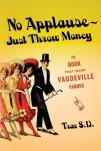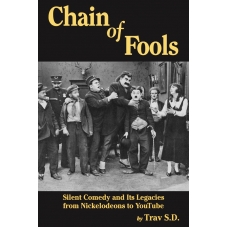Today is the birthday of Fay Tincher (1884-1983). One of the many high points of Steve Massa’s recent book Lame Brains and Lunatics is an entire chapter on this star, and she really was a star — one of the biggest to have been so entirely forgotten. She is just the sort we love to champion. It’s not like she was always obscure.
From an affluent Topeka family, Tincher attended Ziegfeld Musical College in Chicago and went into vaudeville and musical comedy, usually in chorus parts. In the early 20th century (1905-1912), she emerges in Broadway shows by Weber and Fields and others. In 1913 she broke into films at a small company called Eclair, but within months was at the much more high profile Reliance/ Majestic working with the likes of D.W. Griffith, Edward Dillon, Tod Browning, and others. It was said she bore a certain resemblance to Mabel Normand; comedy became her bailiwick.
One of her first notable roles was as the vampish Cleo in Griffith’s The Battle of the Sexes with Donald Crisp, Lillian Gish and Owen Moore. She first achieved sustained popularity in the “Bill the Office Boy” series (1914-1915) in which she played Ethel the Stenographer, a gum-chewing gold-digger who wore spit curls, crazy hats and eye-popping contrast-heavy outfits, with stark visual patterns (often stripes, per above). When this series ended, she was DeWolf Hopper’s leading lady at Triangle for a handful of pictures, playing among other things Dulcinea to his Don Quixote in 1916. When Triangle folded in 1917, she briefly had her own production company, releasing films through the World Film Company. In 1919, she signed with Al Christie, making western comedies, including what is today her best known film Rowdy Ann (1919). After a respite from pictures, she came back strong again in 1923 as Min in the Andy Gump series, based on the popular comic strip, with Joe Murphy as her co-star. This series lasted until 1928, essentially the end of the silent era.
Tincher retired from films and little is known about her subsequent life, aside from the fact that she inherited a decent sum of money in 1930, and she was 99 years old when she died in Brooklyn over a half century later. Anita Loos and others have stated that she may have been a lesbian, a possible explanation for why she may have withdrawn from films in a time of increasing conservatism and control in Hollywood.
But we live in an exciting time, and thanks to the work of Massa and others, Tincher is finally being rediscovered. Here she is in Rowdy Ann:
For more on silent and slapstick comedy please check out my new book: Chain of Fools: Silent Comedy and Its Legacies from Nickelodeons to Youtube, just released by Bear Manor Media, also available from amazon.com etc etc etc
To find out about the history of vaudeville, consult No Applause, Just Throw Money: The Book That Made Vaudeville Famous, available at Amazon, Barnes and Noble, and wherever nutty books are sold.



